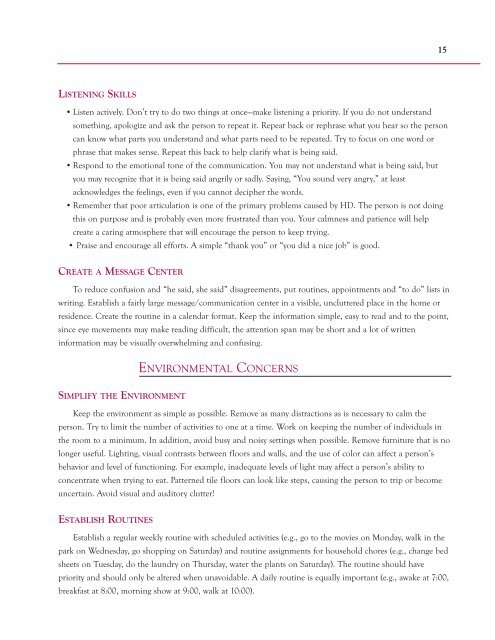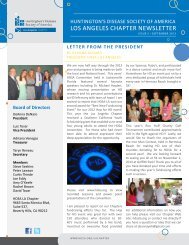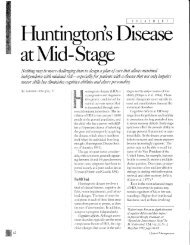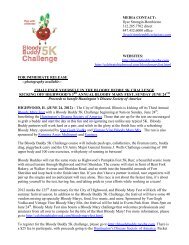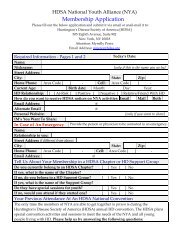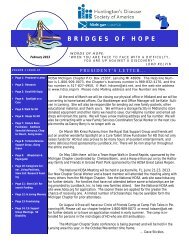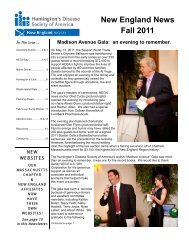Understanding Behavior in HD.final.8-18-05 - Huntington's Disease ...
Understanding Behavior in HD.final.8-18-05 - Huntington's Disease ...
Understanding Behavior in HD.final.8-18-05 - Huntington's Disease ...
Create successful ePaper yourself
Turn your PDF publications into a flip-book with our unique Google optimized e-Paper software.
15<br />
LISTENING SKILLS<br />
• Listen actively. Don’t try to do two th<strong>in</strong>gs at once—make listen<strong>in</strong>g a priority. If you do not understand<br />
someth<strong>in</strong>g, apologize and ask the person to repeat it. Repeat back or rephrase what you hear so the person<br />
can know what parts you understand and what parts need to be repeated. Try to focus on one word or<br />
phrase that makes sense. Repeat this back to help clarify what is be<strong>in</strong>g said.<br />
• Respond to the emotional tone of the communication. You may not understand what is be<strong>in</strong>g said, but<br />
you may recognize that it is be<strong>in</strong>g said angrily or sadly. Say<strong>in</strong>g, “You sound very angry,” at least<br />
acknowledges the feel<strong>in</strong>gs, even if you cannot decipher the words.<br />
• Remember that poor articulation is one of the primary problems caused by <strong>HD</strong>. The person is not do<strong>in</strong>g<br />
this on purpose and is probably even more frustrated than you. Your calmness and patience will help<br />
create a car<strong>in</strong>g atmosphere that will encourage the person to keep try<strong>in</strong>g.<br />
• Praise and encourage all efforts. A simple “thank you” or “you did a nice job” is good.<br />
CREATE A MESSAGE CENTER<br />
To reduce confusion and “he said, she said” disagreements, put rout<strong>in</strong>es, appo<strong>in</strong>tments and “to do” lists <strong>in</strong><br />
writ<strong>in</strong>g. Establish a fairly large message/communication center <strong>in</strong> a visible, uncluttered place <strong>in</strong> the home or<br />
residence. Create the rout<strong>in</strong>e <strong>in</strong> a calendar format. Keep the <strong>in</strong>formation simple, easy to read and to the po<strong>in</strong>t,<br />
s<strong>in</strong>ce eye movements may make read<strong>in</strong>g difficult, the attention span may be short and a lot of written<br />
<strong>in</strong>formation may be visually overwhelm<strong>in</strong>g and confus<strong>in</strong>g.<br />
ENVIRONMENTAL CONCERNS<br />
SIMPLIFY THE ENVIRONMENT<br />
Keep the environment as simple as possible. Remove as many distractions as is necessary to calm the<br />
person. Try to limit the number of activities to one at a time. Work on keep<strong>in</strong>g the number of <strong>in</strong>dividuals <strong>in</strong><br />
the room to a m<strong>in</strong>imum. In addition, avoid busy and noisy sett<strong>in</strong>gs when possible. Remove furniture that is no<br />
longer useful. Light<strong>in</strong>g, visual contrasts between floors and walls, and the use of color can affect a person’s<br />
behavior and level of function<strong>in</strong>g. For example, <strong>in</strong>adequate levels of light may affect a person’s ability to<br />
concentrate when try<strong>in</strong>g to eat. Patterned tile floors can look like steps, caus<strong>in</strong>g the person to trip or become<br />
uncerta<strong>in</strong>. Avoid visual and auditory clutter!<br />
ESTABLISH ROUTINES<br />
Establish a regular weekly rout<strong>in</strong>e with scheduled activities (e.g., go to the movies on Monday, walk <strong>in</strong> the<br />
park on Wednesday, go shopp<strong>in</strong>g on Saturday) and rout<strong>in</strong>e assignments for household chores (e.g., change bed<br />
sheets on Tuesday, do the laundry on Thursday, water the plants on Saturday). The rout<strong>in</strong>e should have<br />
priority and should only be altered when unavoidable. A daily rout<strong>in</strong>e is equally important (e.g., awake at 7:00,<br />
breakfast at 8:00, morn<strong>in</strong>g show at 9:00, walk at 10:00).


